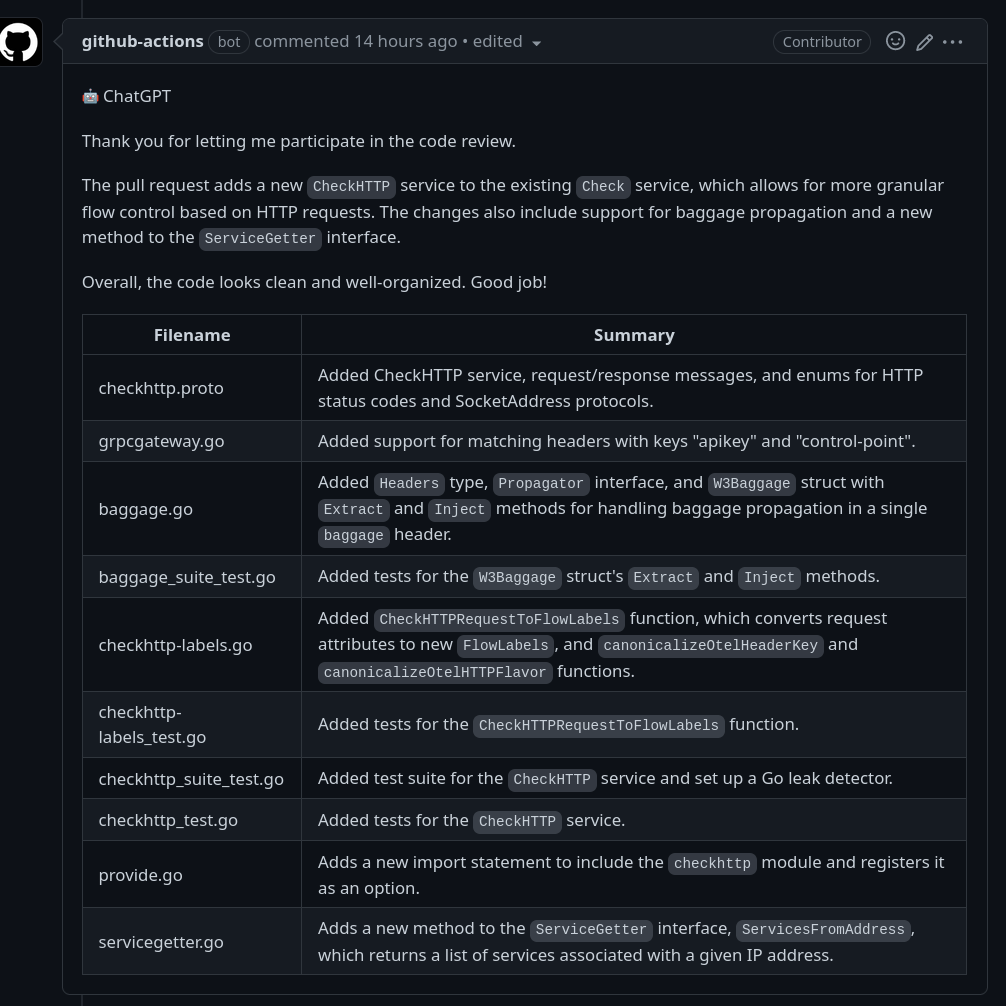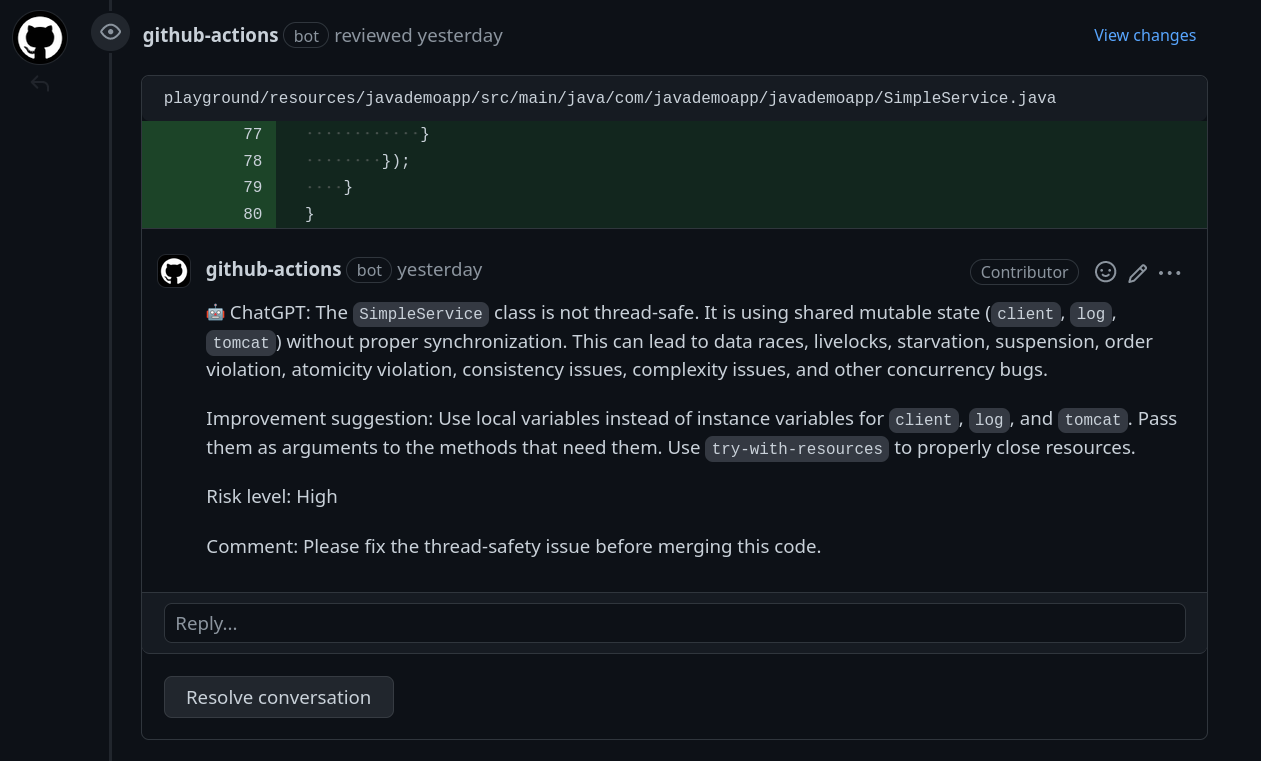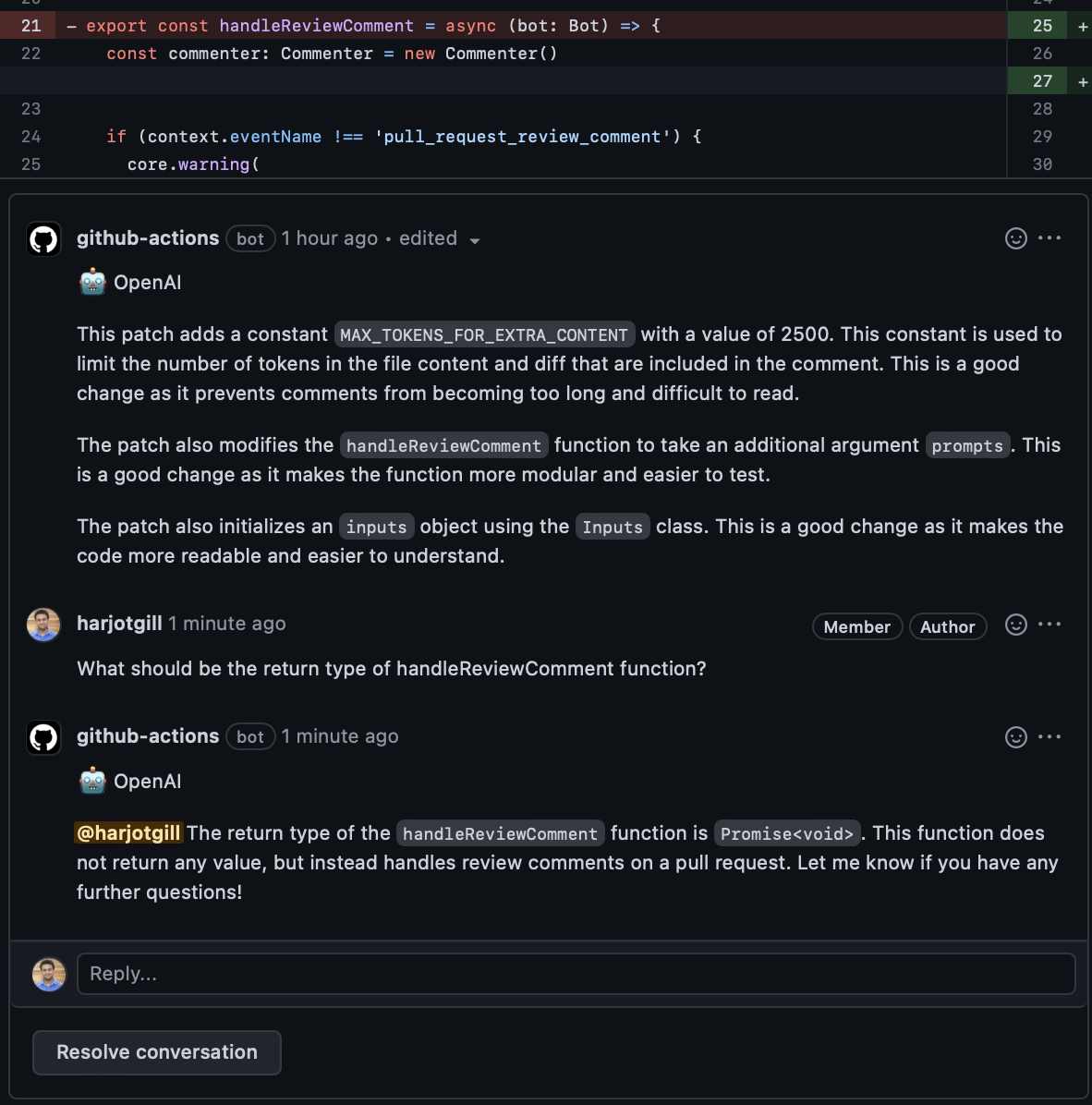This OpenAI ChatGPT-based GitHub Action provides a summary, release notes and review of pull requests. The prompts have been tuned for a concise response. To prevent excessive notifications, this action can be configured to skip adding review comments when the changes look good for the most part.
In addition, this action can also reply to the user comments made on the review by this action.
NOTES:
- Your code (files, diff, PR title/description) will be sent to OpenAI's servers for processing. Please check with your compliance team before using this on your private code repositories.
- OpenAI's API is used instead of ChatGPT session on their portal. OpenAI API has a more conservative data usage policy compared to their ChatGPT offering.
- This action is not affiliated with OpenAI.
- This action is going through rapid iteration, so expect breaking changes.
Add the below file to your repository at
.github/workflows/openai-pr-reviewer.yml
name: Code Review
permissions:
contents: read
pull-requests: write
on:
pull_request:
pull_request_review_comment:
types: [created]
concurrency:
group:
${{ github.repository }}-${{ github.event.number || github.head_ref ||
github.sha }}-${{ github.workflow }}-${{ github.event_name ==
'pull_request_review_comment' && 'pr_comment' || 'pr' }}
cancel-in-progress: ${{ github.event_name != 'pull_request_review_comment' }}
jobs:
review:
runs-on: ubuntu-latest
steps:
- uses: fluxninja/openai-pr-reviewer@latest
env:
GITHUB_TOKEN: ${{ secrets.GITHUB_TOKEN }}
OPENAI_API_KEY: ${{ secrets.OPENAI_API_KEY }}
with:
debug: false
review_comment_lgtm: falseYou can reply to a review comment made by this action and get a response based
on the diff context. Additionally, you can invite the bot to a conversation by
tagging it in the comment (@openai).
Example:
@openai Please generate a test plan for this file.
Note: A review comment is a comment made on a diff or a file in the pull request.
Sometimes it is useful to ignore a PR. For example, if you are using this action to review documentation, you can ignore PRs that only change the documentation. To ignore a PR, add the following keyword in the PR description:
@openai: ignore
GITHUB_TOKEN: This should already be available to the GitHub Action environment. This is used to add comments to the pull request.OPENAI_API_KEY: use this to authenticate with OpenAI API. You can get one here. Please add this key to your GitHub Action secrets.OPENAI_API_ORG: (optional) use this to use the specified organisation with OpenAI API if you have multiple. Please add this key to your GitHub Action secrets.
At FluxNinja, we use gpt-3.5-turbo for lighter tasks such as summarizing the
changes (openai_light_model in configuration) and gpt-4 for more complex
review and commenting tasks (openai_heavy_model in configuration).
Costs: gpt-3.5-turbo is dirt cheap. gpt-4 is orders of magnitude more
expensive, but the results are vastly superior. We are typically spending $50 a
day for a 20 developer team with gpt-4 based review and commenting.
See: action.yml
Tip: You can change the bot personality by configuring the system_message
value. For example, to review docs/blog posts, you can use the following prompt:
Blog Reviewer Prompt
system_message: |
You are `@openai` (aka `github-actions[bot]`), a language model
trained by OpenAI. Your purpose is to act as a highly experienced
DevRel (developer relations) professional with focus on cloud-native
infrastructure.
Company context -
FluxNinja is a cloud-native intelligent load management platform.
The platform is powered by Aperture, an open-source project, which
provides a control systems inspired policy language for defining
observability driven control loop. FluxNinja's load management,
such as prioritized load shedding and load-based autoscaling,
ensures system stability. FluxNinja ARC, the commercial solution,
offers advanced analytics, intelligent alerting, and policy
visualization.
When reviewing or generating content focus on key areas such as -
- Accuracy
- Relevance
- Clarity
- Technical depth
- Call-to-action
- SEO optimization
- Brand consistency
- Grammar and prose
- Typos
- Hyperlink suggestions
- Graphics or images (suggest Dall-E image prompts if needed)
- Empathy
- EngagementAny suggestions or pull requests for improving the prompts are highly appreciated.
First, you'll need to have a reasonably modern version of
nodehandy, tested with node 16.
Install the dependencies
$ npm installBuild the typescript and package it for distribution
$ npm run build && npm run packageGitHub Actions limits the access of secrets from forked repositories. To enable
this feature, you need to use the pull_request_target event instead of
pull_request in your workflow file. Note that with pull_request_target, you
need extra configuration to ensure checking out the right commit:
name: Code Review
permissions:
contents: read
pull-requests: write
on:
pull_request_target:
types: [opened, synchronize, reopened]
pull_request_review_comment:
types: [created]
concurrency:
group:
${{ github.repository }}-${{ github.event.number || github.head_ref ||
github.sha }}-${{ github.workflow }}-${{ github.event_name ==
'pull_request_review_comment' && 'pr_comment' || 'pr' }}
cancel-in-progress: ${{ github.event_name != 'pull_request_review_comment' }}
jobs:
review:
runs-on: ubuntu-latest
steps:
- uses: fluxninja/openai-pr-reviewer@latest
env:
GITHUB_TOKEN: ${{ secrets.GITHUB_TOKEN }}
OPENAI_API_KEY: ${{ secrets.OPENAI_API_KEY }}
with:
debug: false
review_comment_lgtm: falseSee also: https://docs.github.com/en/actions/using-workflows/events-that-trigger-workflows#pull_request_target
Set debug: true in the workflow file to enable debug mode, which will show the
messages




